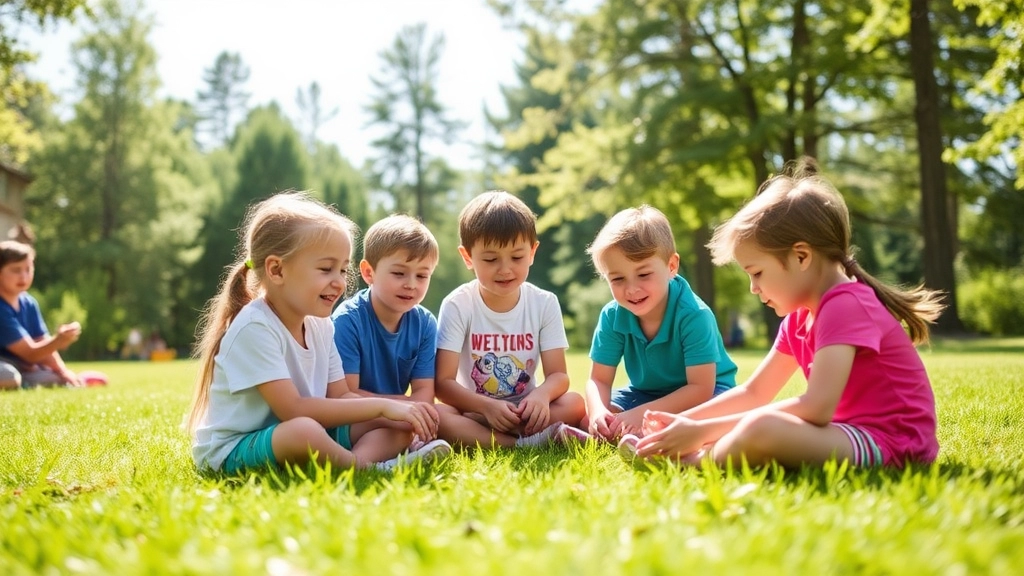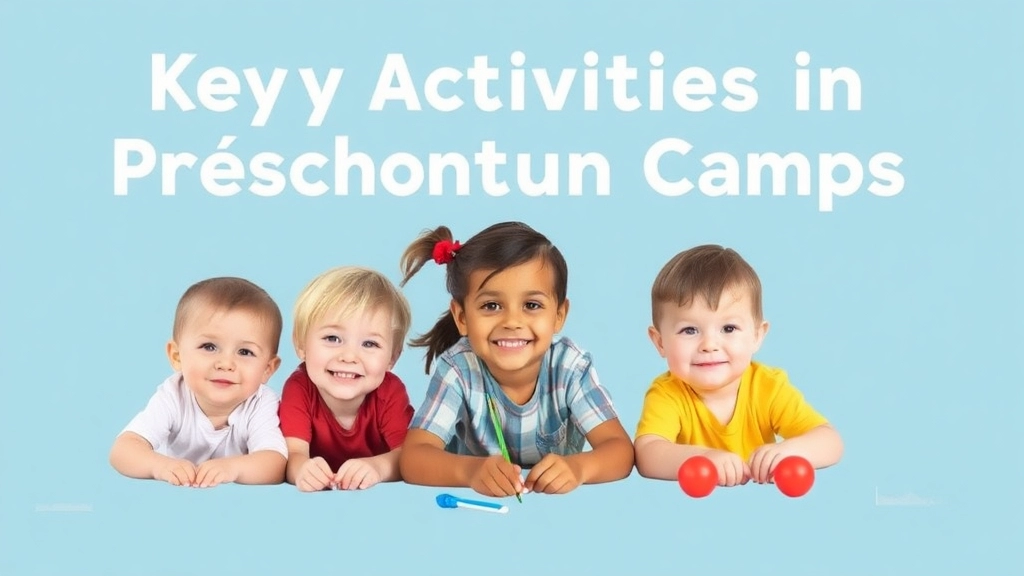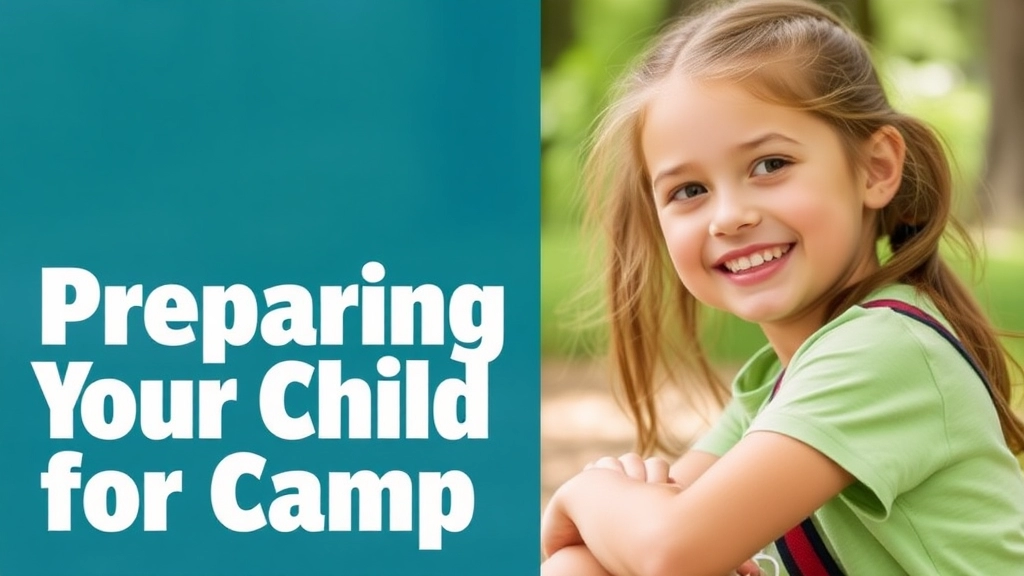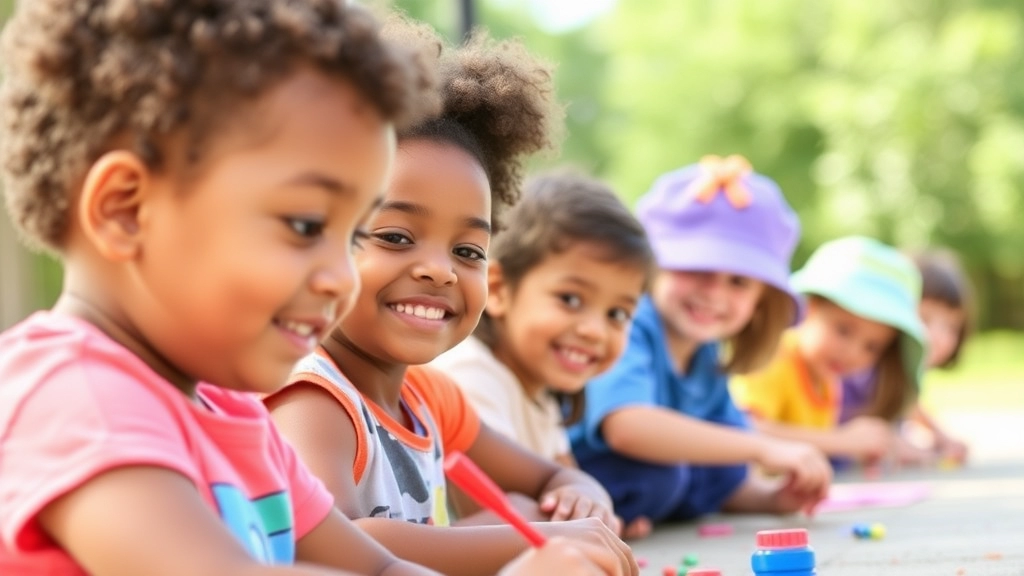Choosing the Right Preschool Summer Camp
As the summer season approaches, many parents find themselves pondering the idea of enrolling their children in preschool summer camps. These camps offer a variety of experiences, from traditional day camps to specialty camps focusing on sports, arts, or even language immersion. But how do you choose the right camp for your child, and what benefits can you expect? In this article, we’ll explore the different types of preschool summer camps, their benefits, and provide tips on how to prepare your child for this exciting adventure.
Benefits of Preschool Summer Camps
Preschool summer camps are more than just a fun way to keep your child occupied during the summer months; they offer numerous developmental benefits. From enhancing social skills and independence to providing structured physical activities and creative outlets, these camps are designed to foster growth in a supportive environment.
Key Considerations
- Safety Considerations: We’ll cover key safety considerations.
- Selecting the Best Camp: How to select the best camp for your child’s needs.
- Practical Tips for Parents: Tips to ensure a smooth camp season.
So, whether your little one is a budding artist, an aspiring athlete, or a curious explorer, there’s a camp out there that’s just right for them.
Types of Preschool Summer Camps
Alright, let’s dive into the world of preschool summer camps. If you’re like most parents, you’re probably wondering, “What type of camp is best for my little one?” There’s a lot to unpack here, so let’s break it down.
Traditional Day Camps
Traditional day camps are the bread and butter of summer camp options. They offer a bit of everythingâarts and crafts, outdoor play, sports, and even some educational activities. Think of these as the all-you-can-eat buffet of summer camps. Your child gets a taste of everything, which is great for keeping them engaged and discovering new interests.
Specialty Camps
Specialty camps focus on one particular area. If your child is showing an early interest in something specific, like music, dance, or even science, a specialty camp could be a perfect fit. These camps are designed to hone in on that interest and develop skills in a fun, immersive environment.
Nature Camps
For the little adventurers, nature camps are fantastic. Kids spend most of their time outdoors exploring, learning about plants, animals, and the environment. It’s like a mini safari, but closer to home. These camps are great for fostering a love for nature and encouraging physical activity.
Sports Camps
Got a future athlete on your hands? Sports camps are all about physical activity and teamwork. Whether it’s soccer, swimming, or gymnastics, these camps focus on developing athletic skills and promoting a healthy lifestyle. Plus, they’re a great way for kids to burn off all that extra energy.
Art and Creativity Camps
Art and creativity camps are perfect for the budding artist or performer. These camps delve into activities like painting, drawing, drama, and even music. It’s all about encouraging self-expression and creativity. If your child loves to create, this might be the ideal summer camp.
Academic Camps
Yes, even preschoolers can get a head start on learning. Academic camps are designed to be educational but in a fun, engaging way. Think of them as a mix of learning and play. They often cover basics like reading, maths, and science through interactive activities and games.
Faith-Based Camps
If you’re looking for something that aligns with your family’s values, faith-based camps could be a good match. These camps incorporate religious teachings and activities along with the usual camp fun. It’s a way to nurture both the spiritual and social development of your child.
Language Immersion Camps
Language immersion camps are fantastic for introducing your child to a new language. These camps offer activities and lessons in a different language, making it a fun and natural way for kids to pick up new linguistic skills. Perfect for giving your child a head start in our globalised world.
Parent-and-Child Camps
Lastly, parent-and-child camps allow you to join in on the fun. These camps are designed for parents who want to experience camp alongside their kids. It’s a great bonding opportunity and allows you to see firsthand the kind of activities your child is engaging in.
So, there you have it. A quick rundown of the types of preschool summer camps available. Whether your child is a budding artist, a mini athlete, or a little explorer, there’s a camp out there that’s just right for them.
Benefits of Enrolling in Summer Camps

Ever wondered why summer camps are a big deal for preschoolers?
What’s all the hype about?
Let’s break it down.
Social Skills Galore
Kids need to socialise.
Summer camps offer a perfect playground for this.
They meet new friends, learn to share, and figure out how to work in a team.
It’s like a social boot camp for little ones.
Boosts Independence
Ever noticed how your child clings to you?
Summer camps can help with that.
Being away from home, even for a few hours, teaches them to be independent.
They learn to make decisions without mum or dad hovering around.
Physical Activity
Kids have energy.
Lots of it.
Summer camps provide structured activities to channel that energy.
From running to swimming, they get to move around and stay fit.
Creativity Unleashed
Camps are a hub for creativity.
Arts and crafts, music, drama – you name it.
These activities stimulate their imagination and creativity.
Routine and Structure
Summer camps provide a routine.
This is crucial for preschoolers.
They learn to follow a schedule, which helps them when they go back to school.
Learning Through Play
Kids learn best when they’re having fun.
Summer camps mix learning with play.
Think science experiments, nature walks, and storytelling.
It’s education without the boredom.
Confidence Booster
Every little achievement at camp boosts their confidence.
Whether it’s completing a craft project or making a new friend, these small wins build their self-esteem.
Real-Life Example
Remember little Timmy from next door?
He was shy, barely spoke a word.
After a summer camp, he’s now the life of the party.
That’s the magic of summer camps.
Quick Recap
- Social Skills: Meeting new friends and teamwork.
- Independence: Making decisions on their own.
- Physical Activity: Staying active and fit.
- Creativity: Engaging in arts and crafts.
- Routine: Learning to follow a schedule.
- Learning Through Play: Fun and educational activities.
- Confidence: Boosting self-esteem with small wins.
So, why not give it a shot?
Enrolling your child in a summer camp could be the best decision you make this summer.
It’s all about giving them the tools they need to grow.
And who knows, they might just come back with a story or two to share.
How to Choose the Right Camp for Your Child
Alright, so you’re thinking about enrolling your child in a preschool summer camp, but you’re not sure how to pick the right one. Trust me, I get it. It’s a big decision, and you want to make sure it’s the best fit for your little one. Let’s break it down.
What Are Your Goals?
First things first, ask yourself: What do you want your child to get out of this camp? Is it about social skills, physical activity, or maybe a bit of both? Knowing your goals will help narrow down the options.
Types of Camps
There are various types of preschool summer camps out there. Here are a few to consider:
- Day Camps: These are perfect if you want your child to come home every day. They offer a range of activities from arts and crafts to sports.
- Specialised Camps: These focus on specific interests like music, science, or nature. If your child has a particular passion, this could be a great fit.
- Mixed Activity Camps: These camps offer a bit of everything, which is great if your child likes variety.
Location, Location, Location
Let’s be real, the camp’s location matters. You don’t want to be driving an hour each way. Look for camps that are conveniently located near your home or work. This will make drop-offs and pick-ups a lot easier.
Safety First
Safety is non-negotiable. Check if the camp is accredited and what their safety protocols are. Do they have trained staff? What’s their emergency plan? These are questions you need answers to.
Staff and Camper Ratio
The staff-to-camper ratio is crucial. The lower the ratio, the more attention your child will get. Ideally, you want a ratio of around 1:6 for preschoolers. This ensures that your child will get the supervision and care they need.
Ask for Recommendations
Word of mouth is powerful. Ask other parents for recommendations. They can give you the inside scoop on what worked for their kids and what didn’t.
Visit the Camp
If possible, visit the camp before making a decision. This will give you a feel for the environment and the staff. Plus, you can see firsthand how the camp is run.
Cost
Let’s talk money. Camps can be pricey, so it’s important to know what you’re getting for your investment. Compare the costs and see if they offer any financial aid or payment plans.
Flexibility
Life happens, and plans change. Check the camp’s cancellation policy and see if they offer any flexibility. This can save you a lot of stress down the line.
Trust Your Gut
At the end of the day, trust your instincts. You know your child best. If something feels off, don’t ignore it. Keep looking until you find a camp that feels right.
Looking for more tips on preparing your child for camp? Check out our section on Ultimate Packing Guide. And if you’re curious about what activities your child might enjoy, head over to Exciting Summer Camp Activities.
Key Activities in Preschool Summer Camps

Alright, let’s dive in.
What do you think preschool summer camps are all about?
Just a bunch of toddlers running around?
Not quite.
These camps are packed with activities that keep the little ones engaged and learning.
Why are activities important?
Because kids this age need more than just play.
They need structured play that teaches them something.
So, let’s break it down.
Arts and Crafts
Kids love making things.
And arts and crafts are a staple in any good summer camp.
From finger painting to making clay models, these activities help develop fine motor skills.
Plus, they get to take home their creations.
Outdoor Play
Fresh air and sunshine.
What more could you ask for?
Outdoor play is crucial.
It could be anything from simple games like tag to more structured activities like obstacle courses.
Story Time
Reading isn’t just for bedtime.
Story time at camp can be magical.
It helps kids develop listening skills and sparks their imagination.
Plus, it’s a great way to wind down after a busy day.
Music and Dance
Who doesn’t love a good dance party?
Music and dance activities get kids moving and grooving.
It’s fun, and it helps with coordination and rhythm.
Science Fun
Yes, you heard it right.
Even preschoolers can enjoy simple science experiments.
Think baking soda volcanoes or growing plants.
It’s all about making learning fun.
Water Play
Summer camps and water play go hand in hand.
Splashing in a kiddie pool or running through sprinklers.
It’s all about staying cool and having fun.
Social Skills
Let’s not forget the social aspect.
Games and group activities teach kids how to interact with others.
Sharing, taking turns, and working as a team.
These are skills they’ll use for life.
Safety Considerations for Summer Camps
Hey there, parents! I know you’re probably wondering, “Is this preschool summer camp safe for my kid?” Let’s dive into some crucial safety considerations for summer camps to put your mind at ease.
Why Safety Matters
First off, safety is non-negotiable. We all want our kids to have fun, but their well-being is the top priority. So, what should you look out for?
Staff Qualifications
One of the first things to check is the camp staff’s qualifications. Are they trained in first aid and CPR? Do they have experience working with preschool-aged children? The more qualified the staff, the more secure you’ll feel.
- CPR and First Aid Training: Ensure all staff members are certified.
- Background Checks: Make sure the camp conducts thorough background checks.
- Experience: Look for staff with prior experience in childcare or education.
Camp Facilities
The camp’s physical environment plays a huge role in safety. Are the playgrounds and indoor areas well-maintained? Are there safety measures like soft ground coverings under play structures?
- Safe Play Areas: Check for well-maintained equipment and soft ground coverings.
- Cleanliness: Ensure the facilities are clean and regularly sanitized.
- Emergency Exits: Make sure there are clear and accessible emergency exits.
Health Protocols
In today’s world, health protocols are more important than ever. What measures does the camp take to prevent illness and handle emergencies?
- Hygiene Practices: Regular handwashing and sanitizing stations.
- Sick Policies: Clear guidelines for what happens if a child falls ill.
- Emergency Procedures: Protocols for handling medical emergencies.
Supervision Ratios
The ratio of staff to children is a big deal. Lower ratios mean more eyes on your child, which translates to better safety.
- Low Ratios: Look for camps with low staff-to-child ratios.
- Constant Supervision: Ensure children are supervised at all times.
Transportation Safety
If the camp involves field trips or any form of transportation, you need to know how they ensure your child’s safety during transit.
- Safe Vehicles: Check that vehicles are well-maintained and equipped with appropriate safety features.
- Qualified Drivers: Ensure drivers have the necessary qualifications and experience.
Real Talk: Stories from the Trenches
I’ve heard from parents who’ve had both good and bad experiences. One mum told me about a camp where her child scraped a knee and the staff handled it like prosâimmediate first aid, a call to her, and a detailed incident report. On the flip side, another parent shared a horror story of a camp with broken equipment and inattentive staff. The lesson? Do your homework!
Preparing Your Child for Camp

Worried about sending your little one to their first preschool summer camp?
You’re not alone.
Many parents feel a mix of excitement and anxiety when it comes to this big step.
But don’t stress.
I’ve got some straightforward tips to make the transition smoother for both you and your child.
Get Them Excited
Start by talking about the camp.
Share stories about fun activities like arts and crafts, nature walks, and sing-alongs.
Use simple language to explain what camp is all about.
Example: “You’ll get to play with new friends and make cool stuff with your hands!”
Visit the Camp Together
If possible, take a tour of the camp.
Let your child see where they’ll be spending their days.
Meeting the staff and seeing the playground can make the unknown feel familiar.
Practice Independence
Encourage small tasks at home to build confidence.
- Let them pack their own bag.
- Practice dressing themselves.
- Teach them to ask for help when needed.
Pack the Essentials
Make a checklist of what to pack.
- Comfortable clothes
- Sunscreen
- A hat
- Water bottle
- Favourite snack
Label everything with their name.
Talk About Feelings
Acknowledge their feelings.
It’s normal to feel nervous.
Reassure them that it’s okay to miss home but they’ll have so much fun they won’t even notice!
Role Play
Play “camp” at home.
Pretend you’re the camp leader and your child is a camper.
Go through a typical camp day to set expectations.
Stay Positive
Your attitude matters.
If you’re excited, they’ll be excited too.
Share your own positive experiences if you went to camp as a kid.
Connect With Other Parents
Join online forums or local parent groups.
Share tips and stories.
Knowing other kids are in the same boat can be comforting.
Keep Communication Open
Let them know they can talk to you about anything.
Make a plan to chat about their day when they get home.
Tips for Parents During Camp Season
Worried about sending your little one to summer camp?
I get it.
It’s a big step.
But don’t sweat it; I’ve got you covered with some solid tips to make the camp season smooth sailing.
Stay Connected Without Hovering
You want to know how your child is doing but don’t want to be that parent who’s always calling.
Here’s a balance:
- Check-ins: Set up a schedule with the camp for regular updates.
- Letters: Encourage your child to write letters or draw pictures.
- Photos: Many camps post daily photos online. Keep an eye out.
Pack Smart, Not Overboard
Packing can be a nightmare.
But it doesn’t have to be.
Essentials:
- Labels: Label everything. Trust me, you don’t want to lose that favourite teddy.
- Comfort Items: One or two items from home can make a world of difference.
- Weather Gear: Sunscreen, hats, and raincoats. Be ready for anything.
Encourage Independence
Camp is a great time for your child to spread their wings.
Here’s how you can help:
- Decision-Making: Let them choose some of their packing items.
- Self-Care: Teach them simple self-care tasks like brushing teeth or tying shoes.
- Problem-Solving: Role-play scenarios where they might need to ask for help.
Keep the Routine
Summer camp doesn’t mean throwing routine out the window.
Stick to:
- Bedtime: Try to keep a consistent bedtime leading up to camp.
- Meals: Encourage balanced meals, even if it’s just a chat about what they ate.
- Activities: Maintain some of their usual activities, like reading before bed.
Prepare for Homesickness
Homesickness is real and it’s okay.
Combat it by:
- Talking About It: Discuss feelings and let them know it’s normal.
- Comfort Items: A small item from home can be a big comfort.
- Positive Spin: Focus on the fun and exciting activities they’ll be doing.
Engage Post-Camp
When camp is over, your role isn’t.
Keep the momentum:
- Ask Questions: What was their favourite activity? Who did they meet?
- Celebrate Growth: Notice and praise any new skills or independence.
- Plan Ahead: If they loved it, start planning for next year.
For more tips on what to include in your child’s camp packing list, check out our Ultimate Packing Checklist. Also, if you’re still looking for the perfect camp, discover some Top Summer Camps for Teens that offer a variety of activities.
FAQs About Preschool Summer Camps
What are the benefits of enrolling my child in a preschool summer camp?
Enrolling your child in a preschool summer camp offers numerous benefits including the development of social skills, increased independence, physical activity, enhanced creativity, routine and structure, learning through play, and a boost in confidence.
How do summer camps help in developing social skills?
Summer camps provide a perfect environment for children to meet new friends, learn to share, and work in a team. It’s like a social boot camp for little ones, helping them to socialize effectively.
Can summer camps help my child become more independent?
Yes, being away from home, even for a few hours, teaches children to be independent. They learn to make decisions without parents hovering around, which boosts their confidence and self-reliance.
What kind of physical activities are included in preschool summer camps?
Preschool summer camps often include structured physical activities such as running, swimming, and outdoor play. These activities help children channel their energy and stay fit.
How do summer camps enhance creativity in children?
Summer camps are hubs for creativity, offering activities like arts and crafts, music, and drama. These activities stimulate children’s imagination and creativity, allowing them to explore different forms of self-expression.
What is the importance of routine and structure in summer camps?
Preschool summer camps provide a routine that is crucial for young children. Following a schedule helps them transition back to school more smoothly and teaches them the importance of structure in daily life.
How do children learn through play at summer camps?
Summer camps mix learning with play through activities like science experiments, nature walks, and storytelling. This approach makes education fun and engaging for preschoolers.
Do summer camps help in boosting a child’s confidence?
Every small achievement at camp, whether it’s completing a craft project or making a new friend, boosts a child’s self-esteem and confidence. These small wins are crucial for their overall development.
What are some key activities in preschool summer camps?
Key activities in preschool summer camps include arts and crafts, outdoor play, story time, music and dance, simple science experiments, water play, and social skills development through group activities.
How can I prepare my child for their first preschool summer camp?
To prepare your child, you can get them excited by talking about the camp activities, visit the camp together, practice independence at home, pack the essentials, talk about their feelings, role play camp scenarios, stay positive, connect with other parents, and keep communication open.
What should I pack for my child’s preschool summer camp?
Essentials to pack include comfortable clothes, sunscreen, a hat, a water bottle, and their favorite snack. Make sure to label everything with their name to avoid any mix-ups.
How can I help my child feel less anxious about going to camp?
Reassure your child that it’s normal to feel nervous and that they will have a lot of fun. Role-playing camp scenarios at home and staying positive about the experience can also help alleviate their anxiety.
References
-
The Benefits of Summer Camp for Kids
-
The Benefits of Summer Camp
-
10 Reasons Why Kids Should Go to Summer Camp

